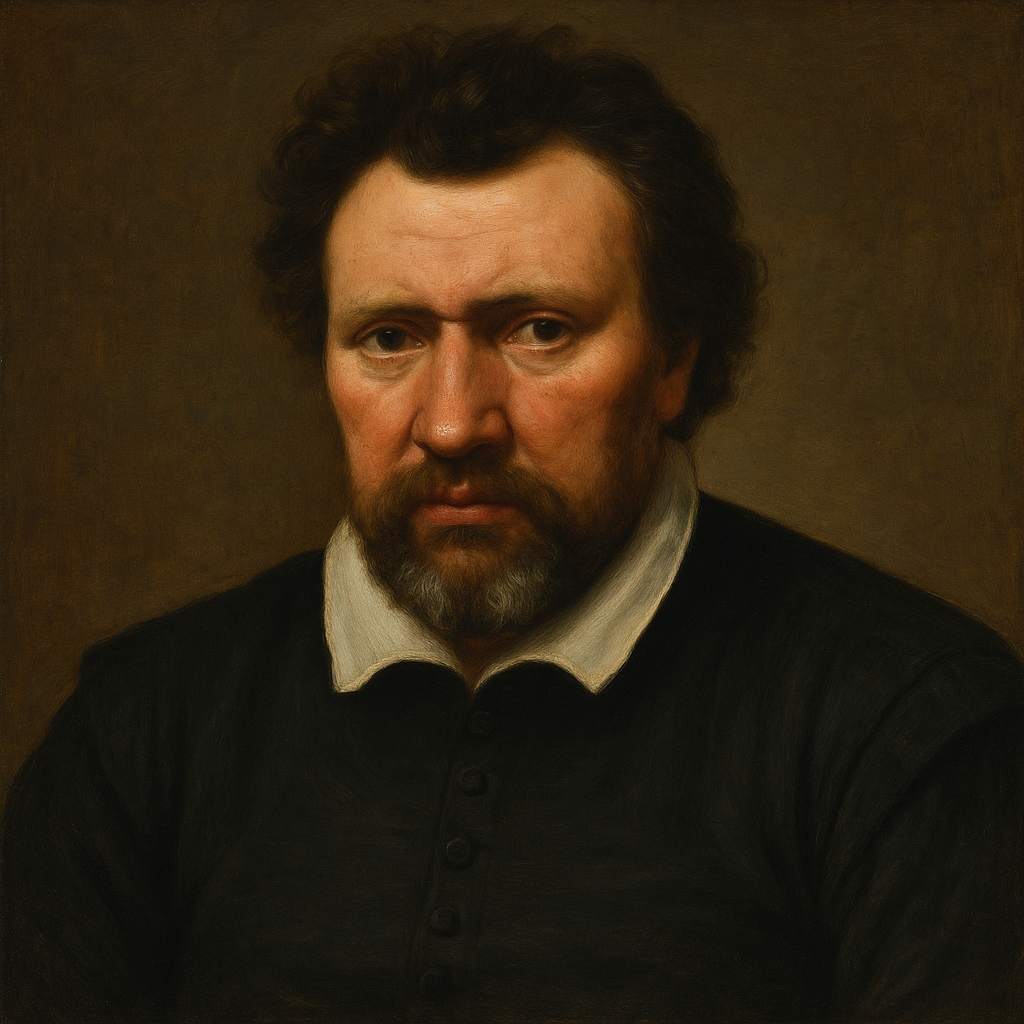2 Poems by Ben Jonson
1572 - 1637
Ben Jonson Biography
Ben Jonson, born in 1572 in Westminster, London, stands as one of the most influential figures in English Renaissance literature, second only to his contemporary and sometime rival, William Shakespeare. His life was as colorful and tumultuous as the Elizabethan and Jacobean eras in which he lived, marked by both tremendous literary success and personal tribulations.
Jonson's early years were shaped by adversity. His father, a minister, died just a month before Ben's birth, leaving his mother to remarry a bricklayer. This humble beginning would later fuel Jonson's fierce pride in his self-made status as a man of letters. Despite his stepfather's trade, young Ben showed early promise in his studies. He attended Westminster School under the tutelage of the renowned scholar William Camden, who recognized and nurtured Jonson's intellectual gifts.
After leaving school, Jonson briefly worked as a bricklayer, an experience he would later reference with a mixture of pride and self-deprecating humor in his works. However, his true calling lay elsewhere, and he soon found himself drawn to the world of theater. Jonson's early career as an actor and playwright was turbulent. In 1597, he was imprisoned for his part in writing the satirical play "The Isle of Dogs," which was deemed seditious by authorities. This brush with the law would not be his last; Jonson's sharp wit and tendency towards controversy would land him in trouble repeatedly throughout his life.
The turning point in Jonson's career came in 1598 with the production of his comedy "Every Man in His Humour" at the Curtain Theatre. The play was a resounding success, establishing Jonson as a dramatist of note and marking the beginning of his long association with the Lord Chamberlain's Men, the company that included Shakespeare. This success, however, was quickly followed by personal tragedy. That same year, Jonson killed fellow actor Gabriel Spencer in a duel, narrowly escaping execution by pleading benefit of clergy.
The early years of the 17th century saw Jonson at the height of his creative powers. He produced a string of brilliant satirical comedies, including "Volpone" (1606), "The Alchemist" (1610), and "Bartholomew Fair" (1614). These works showcased Jonson's mastery of classical form, his biting wit, and his keen observation of human folly. Unlike Shakespeare, who drew inspiration from a wide range of sources, Jonson prided himself on his adherence to classical unities and his erudition, often peppering his plays with Latin quotations and obscure references.
Jonson's literary ambitions extended beyond the stage. He was a prolific poet, penning both lyric verses and epigrams that displayed his versatility as a writer. His poem "To Celia" ("Drink to me only with thine eyes") remains one of the most beloved lyrics in the English language. Jonson was also a pioneer in the development of the English masque, a form of courtly entertainment that combined elements of dance, music, and poetry. His collaborations with architect Inigo Jones on these lavish productions were particularly noteworthy, though their relationship was often strained by creative differences.
In 1616, Jonson took the unprecedented step of publishing his collected works, a move that asserted his status as a serious literary figure rather than a mere entertainer. This folio edition included not only his plays but also his poetry and masques, cementing his reputation as a man of letters. The same year, he was granted a royal pension, effectively making him England's first Poet Laureate, though the title was not officially bestowed.
Jonson's later years were marked by declining health and financial difficulties, but his literary output remained prodigious. He continued to write plays, though with diminishing commercial success, and focused increasingly on poetry and prose works. His "Timber, or Discoveries," a collection of observations on literature and life published posthumously, provides valuable insights into his literary theories and his views on contemporaries like Shakespeare.
Throughout his career, Jonson was at the center of London's literary scene. He presided over a circle of younger poets and playwrights known as the "Tribe of Ben," who looked to him as a mentor and model. His influence on subsequent generations of English writers, particularly in the realm of comedy and satire, was profound and long-lasting.
Jonson's relationship with Shakespeare has long fascinated scholars and biographers. While they were undoubtedly rivals, there was also mutual respect and even friendship between them. Jonson's famous tribute to Shakespeare in the First Folio, praising him as "not of an age, but for all time," is testament to his ability to recognize greatness even in a competitor.
Ben Jonson died in 1637, leaving behind a legacy as complex and multifaceted as the man himself. He was buried in Westminster Abbey with the epitaph "O Rare Ben Jonson" inscribed on his gravestone. A master of multiple genres, a scholar-poet equally at home in taverns and royal courts, Jonson embodied the contradictions and vitality of his age. His works continue to be studied and performed, offering modern audiences a window into the rich literary culture of Renaissance England and the enduring power of sharp wit and keen observation.
This text was generated by AI and is for reference only. Learn more
Username Information
No username is open
Everything is free to use, but donations are always appreciated.
Quick Links
© 2024-2025 R.I.Chalmers (V2Melody).

All music on this site by R.I.Chalmers (V2Melody) is licensed under a Creative Commons Attribution-NonCommercial 4.0 International License.
Attribution Requirement:
When using this music, you must give appropriate credit by including the following statement (or equivalent) wherever the music is used or credited:
"Music by R.I.Chalmers (V2Melody) – https://v2melody.com"
Support My Work:
If you enjoy this music and would like to support future creations, your thanks are always welcome but never required.
Say Thanks!



